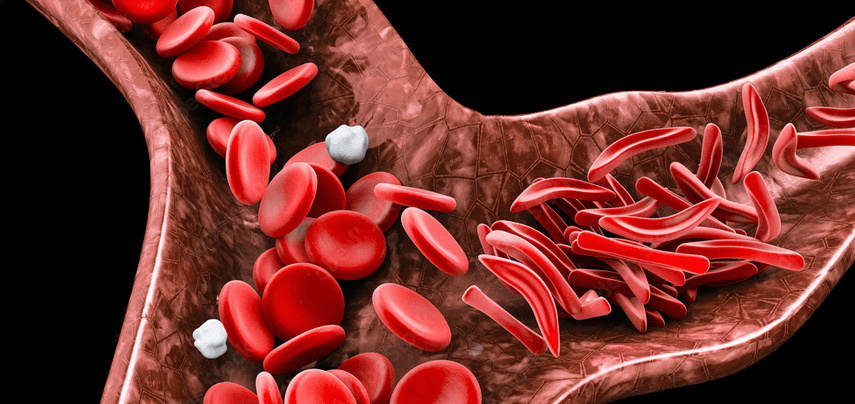ABC of Sickle Cell Disease
Table des matières
Sickle Cell Disease (also called Sickle Cell Anemia) is a group of red blood cell disorders you have inherited and are born with. Sickle Cell Disease is caused by an abnormal form of Hemoglobin. This is the part of your red blood cell that carries oxygen around the body and keeps your vital organs working. In Sickle Cell Disease, the abnormal Hemoglobin (HbS) is not able to work properly. The red blood cells become stiff and block up the blood vessels in your body, causing pain and damage, and they also get destroyed quickly, leading to anemia and other complications. Currently, there is no universal cure for Sickle Cell Disease and approximately 4000 Ontarians have the disease.
There is a substance in the red cell called hemoglobin. It carries oxygen from the air in our lungs to all parts of the body including the blood cells. One little change in this substance causes the hemoglobin to form long rods in the red cells when it gives away oxygen. These rigid rods change the red cells into a sickle shape instead of the normal round shape
Normal red blood cells contain hemoglobin A. Hemoglobin S and hemoglobin C are abnormal types of hemoglobin. Normal red blood cells are soft and round and can squeeze through tiny blood tubes (vessels). Normally, red blood cells live for about 120 days before new ones replace them.
People with sickle cell conditions make a different form of hemoglobin A called hemoglobin S (S stands for sickle). Red blood cells containing mostly hemoglobin S do not live as long as normal red blood cells (averagely about 16 days).
It is something you will have your whole life, and need to learn how to live with it, so that you can continue living as normally as possible, with schooling, work, and family life. As it is inherited, you also need to know your partner’s sickle cell status as you could pass it onto your future children too.
Types of SCD There are several types of SCD. The most common are Sickle Cell Anemia (SS), Sickle-Hemoglobin C Disease (SC), Sickle Beta-Plus Thalassemia, and Sickle Beta-Zero Thalassemia.
Sickle Cell Trait (AS) is an inherited condition in which both hemoglobin A and S are produced in the red blood cells, always more A than S. Sickle cell trait is not a type of sickle cell disease. People with sickle cell trait are generally healthy. A carrier has one normal and one sickle hemoglobin gene. A carrier does not have, and will not develop sickle cell disease. All races should be screened for this hemoglobin at birth.
A carrier of sickle cell disease is also said to have the sickle cell trait. This person has inherited a sickle cell gene from a parent, but does not have SCD and is not more likely to get sick than any other person. They do not need special medical care and will not develop SCD at any time in their life.
Why is it helpful to know that I am a carrier of SCD, or whether my child is a carrier? Knowing whether you or your child has the sickle cell trait is important for several reasons. When you are ready to have a family, your partner can have carrier testing so that you know, as a couple, if there is a chance of having a child with SCD. By having this information, you can let your child know if he or she is a carrier of SCD in the future.
When a Child has Sickle Cell Trait
When a child has a copy of the sickle cell gene, it is very likely that one of the parents has a copy of the sickle cell gene, or:
Both parents are carriers
One parent actually has SCD
One parent is a carrier and the other has SCD
If I have more children, could they have Sickle Cell Disease?
Most often when a child is a carrier of SCD, only one parent is a carrier and the chance to have a baby with SCD is very low
When both parents are carriers, each pregnancy they have has:
1 in 4 (25%) chance of having SCD
1 in 2 (50%) chance of being a carrier (but not having SCD)
1 in 4 (25%) chance of not having SCD or being a carrier
You can have a blood test to find out if you are a carrier of SCD. If you want to have this test, talk to your healthcare provider. A carrier does not have, and will not develop sickle cell disease.
Sickle Cell Trait in Ontario:
A significant percentage of Ontarians of African descent may carry the sickle cell gene and in some cases, depending on the area of origin, the trait rate may be as high as 25%. People with SCT do not normally experience symptoms of SCD and do not need special medical care. Knowing your Sickle Cell status matters!
Anyone can have SCD or trait including Caucasians but it is seen more in people from Africa, the Mediterranean, Caribbean, Middle East, South East Asia, Western Pacific Region, South America, and Central America. SCD runs in families and is caused by a problem with the hemoglobin gene. Genes are the instructions that tell our bodies how to grow and develop. Most people have two normal copies of the hemoglobin gene – one from their mother and one from their father. A person with SCD has two sickle hemoglobin genes, one from each parent. For a couple to have a child with sickle cell disease, both parents must be carriers. A carrier of SCD has one normal hemoglobin gene
What are the complications to look for?
SCD causes problems in 2 ways, by the breakdown of the red blood cell (hemolysis) and by blocking the flow of blood in the blood vessels (vaso-occlusion). This most commonly causes pain, especially in the bones. Other painful complications include priapism (see below), damage to the shoulder and hip joints (avascular necrosis), chest pain (acute chest syndrome). There are also a lot of problems that may not be painful. These include damage to the lungs, heart (heart failure, pulmonary hypertension), kidney, liver and eyes, and also stroke, leg ulcers, infections. Because it can damage all of these body “systems”, sickle cell disease is an example of a “multisystem disorder”.
How can I prevent developing these complications?
Many complications can be prevented or reduced by either regular blood transfusions or Hydroxyurea tablets. However, both of these have side effects and there are simple lifestyle changes that can make a big difference. These include regular exercise, a good diet, not smoking, and not drinking too much. Reducing the amount of stress in your life is also important, as is avoiding things that can provoke a painful crisis. Making sure you are up to date with vaccinations can help to prevent serious infections.By seeing your doctor in the clinic, when not in crisis, you have an opportunity to discuss these ways of coping with SCD and reducing complications
Treatment of complications:
Treatment of complications often includes antibiotics, pain management, intravenous fluids, blood transfusion, and surgery all backed by psychosocial support. Like all patients with chronic disease patients are best managed in a comprehensive multi-disciplinary program of care. Screening newborns for SCD are perhaps the first step to effective treatment of the disease. NBS will grant the patient, early enough access to penicillin prophylaxis, vaccination against pneumococcus bacteria, and folic acid supplementation.
Articles




